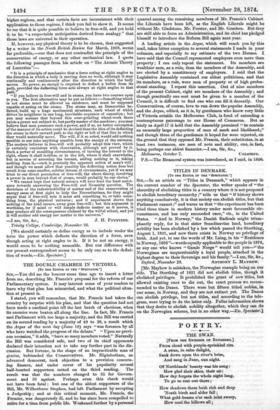THE DOUBLE CHAMBER IN VICTORIA. [To THE EDITOR OF THE
"SPECTATOR."] SIM,—You did me the honour some time ago to insert a letter from me, describing Mr. Francis's proposal for the reform of our Parliamentary system. It may interest some of your readers to learn why that plan has miscarried, and what the political situa- tion at present is.
I stated, you will remember, that Mr. Francis had taken the country by surprise with his plan, and that the question had not been made a cardinal point till the last batch of elections, when its enemies were beaten all along the line. In fact, Mr. Francis met Parliament with too large a majority, and the Bill was carried on its second reading by a majority of 48 to 28, a result which the Argus of the next day (June 18) says "was foreseen by all who have watched the progress of the debate." "Upon no previ- ous occasion," it adds, "have so many members voted." Naturally the Bill was considered safe, and two of its chief opponents declared their intention not to take any further part in the dis- cussion. But fortune, in the shape of an impracticable man of ienius, befriended the Conservatives. Mr. Higinbotham, an advanced democrat, took objection to a provision concern- ing finance, and under cover of his popularity several half-hearted supporters ratted on the third reading. The result was that the numbers changed to 35 for Govern- ment and 33 against. Perhaps even this check would not have been fatal ; but one of the ablest supporters of the Bill, Mr. Wilberforce Stephen, had left Parliament by accepting a Judgeship ; and at this critical moment, Mr. Francis, the Premier, was dangerously ill, and he has since been compelled to retire for a time from public life. Weakened further by a personal quarrel among the remaining members of Mr. Francis's Cabinet the Liberals have been left, as the English Liberals might be without Mr. Gladstone, Mr. Forster, and Mr. Goschen. But they are still able to form an Administration, and its chief has pledged himself to introduce the Reform Bill again next year.
A leading article in the Argus, which will reach you by this mail, takes bitter exception to several statements I made in your columns, and especially to my estimate of the two Houses. I have said that the Council represented employers even more than property ; I can only repeat the statement. Its members are wealthier men, as a rule, than the members of the Assembly, and are elected by a constituency of employers. I said that the Legislative Assembly contained our ablest politicians, and that its members, as a rule, were men of property or of high profes- sional standing. I repeat this assertion. Out of nine members of the present Cabinet, eight are members of the Assembly ; and though practically one seat must be given to a member, of the Council, it is difficult to find one who can fill it decently. Our Conservatives, of course, love to run down the popular Assembly, and the Argus, edited, as it is, by gentlemen who know very little of Victoria outside the Melbourne Club, is fond of extending a contemptuous patronage to our House of Commons. But as lately as April 17 it held that the Assembly promised "to contain an unusually large proportion of men of mark and likelihood ;" and though three of the gentlemen it hoped for were rejected, on the ground that they opposed Mr. Francis, their substitutes, in at least two instances, are men of note and ability, one, in fact, being perhaps our ablest fuiancier.—I am, Sir, &c.,
P.S.—The Bicameral system was introduced, as I said, in 1856..






































 Previous page
Previous page